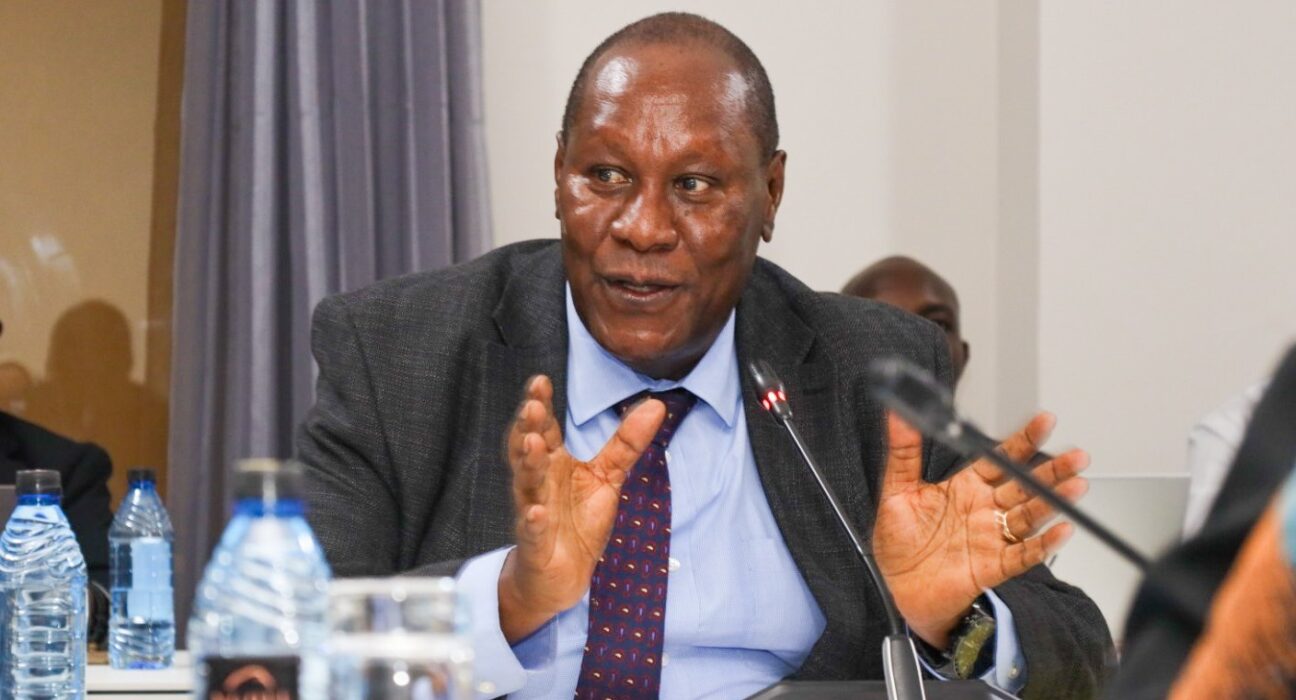The Senate Standing Committee on Finance and Budget met with Kitui County Governor Julius Malombe today to address the county’s Ksh 1.6 billion in pending bills owed to suppliers, contractors, and service providers. The meeting, held in Kitui Town, followed a request for a statement by Kitui Senator Enoch Wambua, who sought clarity on the total value of the debts and the county’s strategy to settle them.
The committee expressed concerns about the Kitui County Pending Bills Review Committee (PBRC), established in 2022 by Governor Malombe to verify creditor claims. Senators questioned the committee’s independence, as it was appointed by the governor, and recommended involving the Office of the Auditor General to ensure transparency before the PBRC’s findings are presented to the County Assembly. They warned that relying solely on the PBRC could lead to selective payments, potentially favoring entities aligned with the county government.
Governor Malombe defended his administration’s efforts, stating that the PBRC had invited and verified all claims to confirm their authenticity. He cited challenges such as delayed exchequer disbursements from the National Treasury, unrealized own-source revenue (OSR) targets, and undisbursed grants as major obstacles to clearing the bills. The county collected Ksh 600 million in OSR against a Ksh 1 billion target in the 2023/2024 financial year, limiting its financial flexibility.
The Senate committee also met with Kitui County Assembly members, led by Speaker Hon. Kevin Katisya, and praised them for clearing all their pending bills. This achievement highlighted a contrast with the County Executive’s ongoing debt issues, prompting the committee to urge the Assembly to strengthen oversight of the Executive’s financial management.
Background of Kitui’s Pending Bills
Pending bills represent unpaid invoices for goods and services delivered to county governments, a widespread issue since devolution began in 2013. Kitui County’s Ksh 1.6 billion debt, part of its Ksh 12.9 billion 2024/2025 budget, affects suppliers, contractors, and SMEs, with some bills inherited from previous administrations. Nationally, counties owe over Ksh 200 billion, according to the Controller of Budget’s 2024 reports.
The issue gained prominence after Senator Wambua raised it in the Senate, prompting the Finance Committee’s visit to Kitui. The committee, chaired by Mandera Senator Ali Roba, aims to ensure counties adhere to the Public Finance Management (County Governments) Regulations, 2015, which mandate timely bill payments.
Senate’s Concerns and Recommendations
During the May 19, 2025, meeting, the Senate Finance Committee raised several issues regarding Kitui’s approach to managing its pending bills:
- PBRC’s Independence: The committee questioned the credibility of the PBRC, noting its appointment by the governor could lead to bias in verifying claims.
- Need for Auditor General Oversight: Senators recommended that the Office of the Auditor General audit the PBRC’s findings to ensure accuracy and fairness before County Assembly approval.
- Risk of Selective Payments: Without independent verification, the county risks prioritizing certain creditors, potentially excluding others.
- Transparency: The lack of a standardized verification process undermines public and creditor confidence.
The committee advised Governor Malombe to collaborate with the Auditor General and publish verified claims to enhance transparency. They also called for stronger coordination with the National Treasury and Council of Governors to address the national pending bills crisis.
Governor Malombe’s Response
Governor Malombe outlined his administration’s efforts to tackle the Ksh 1.6 billion debt, emphasizing the PBRC’s role in verifying claims to prevent fraudulent payments. He highlighted several financial challenges:
- Delayed Exchequer Funds: Irregular disbursements from the National Treasury disrupt payment schedules.
- Low OSR: Kitui’s Ksh 600 million OSR in 2023/2024 fell short of the Ksh 1 billion target, limiting funds for debt repayment.
- Budget Constraints: High recurrent expenditures, such as salaries, reduce allocations for settling bills.
- Undisbursed Grants: Expected development grants have not been received, further straining liquidity.
Malombe stated that his administration plans to prioritize pending bills in the 2025/2026 budget and is exploring ways to boost OSR through digital platforms and streamlined revenue collection.
County Assembly’s Role
The Senate committee commended the Kitui County Assembly, led by Speaker Hon. Kevin Katisya, for clearing all its pending bills. This achievement reflects effective budget management and oversight, contrasting with the Executive’s challenges. The committee urged MCAs to:
- Enhance Oversight: Review the Executive’s financial decisions, including PBRC operations.
- Demand Audits: Require Auditor General reports before approving debt payments.
- Support Transparency: Advocate for public disclosure of verified claims.
The Assembly’s success demonstrates the potential for fiscal discipline within county governance, offering a model for the Executive to follow.
Economic and Social Impact
Kitui’s Ksh 1.6 billion pending bills have significant consequences for its 1.1 million residents and local economy:
- SMEs and Suppliers: Unpaid invoices threaten business viability, leading to layoffs and closures.
- Service Delivery: Delayed payments to healthcare providers and contractors disrupt medicine supplies and infrastructure projects.
- Public Trust: The debt crisis erodes confidence in the county government, with suppliers staging protests in 2024.
Clearing the bills would stimulate Kitui’s economy, support SMEs, and improve service delivery, aligning with devolution’s goals of equitable development.
National Context and Comparisons
Kitui’s crisis is part of a broader national challenge, with counties like Nairobi (Ksh 100 billion) and Mombasa (Ksh 15 billion) also facing significant debts. The Controller of Budget notes that counties allocate 70% of budgets to recurrent costs, leaving little for debt repayment. The National Treasury’s 2023 Pending Bills Resolution Framework aims to clear county debts within three years, but progress is slow.
Other counties offer lessons:
- Makueni: Cleared Ksh 800 million in bills by 2024 through Auditor General audits and digital OSR platforms.
- Nyeri: Reduced debts by 60% since 2022 with a stakeholder-inclusive taskforce.
- Nairobi: Secured a Ksh 10 billion Treasury bailout in 2024, tied to a repayment schedule.
Kitui could adopt Makueni’s transparent verification or Nyeri’s collaborative approach to accelerate debt resolution.
Proposed Solutions
The Senate, Governor Malombe, and stakeholders have outlined measures to address Kitui’s pending bills:
Solutions to Kitui County Pending Bills 2025
Collaborate with the Council of Governors for best practices.
Auditor General Verification:
Engage the Office of the Auditor General to audit PBRC claims for credibility.
Publish verified claims on the county website.
Assembly Oversight:
MCAs to review Executive budgets and demand regular debt reports.
Form a joint oversight committee with Senate representation.
Revenue Enhancement:
Implement digital OSR platforms to target Ksh 1.2 billion annually by 2026.
Streamline property rates and permits.
Treasury Support:
Ensure timely exchequer disbursements.
Enforce the Pending Bills Resolution Framework with dedicated funds.
Debt Repayment Plan:
Allocate 20% of the 2025/2026 budget to debt clearance.
Negotiate installment plans with creditors.
Capacity Building:
Train finance officers on budgeting, in partnership with the Kenya School of Government.
Educate MCAs on oversight roles.
Stakeholder Forums:
Hold quarterly meetings with suppliers and residents to discuss progress.
Stakeholder Roles
- Governor Malombe: Engage the Auditor General, prioritize debt repayment, and boost OSR.
- Creditors: Submit verified claims and join supplier associations for advocacy.
- MCAs: Strengthen oversight and demand transparency.
- Senate: Advocate for a national Pending Bills Relief Fund and conduct regular audits.
- National Treasury: Ensure timely fund disbursements and support debt resolution frameworks.
Kitui’s Ksh 1.6 billion pending bills crisis highlights broader challenges in county financial management. The Senate’s May 19, 2025, intervention emphasizes the need for independent audits, enhanced OSR, and stronger oversight. By addressing these issues, Kitui can clear its debts, support local businesses, and improve service delivery.





